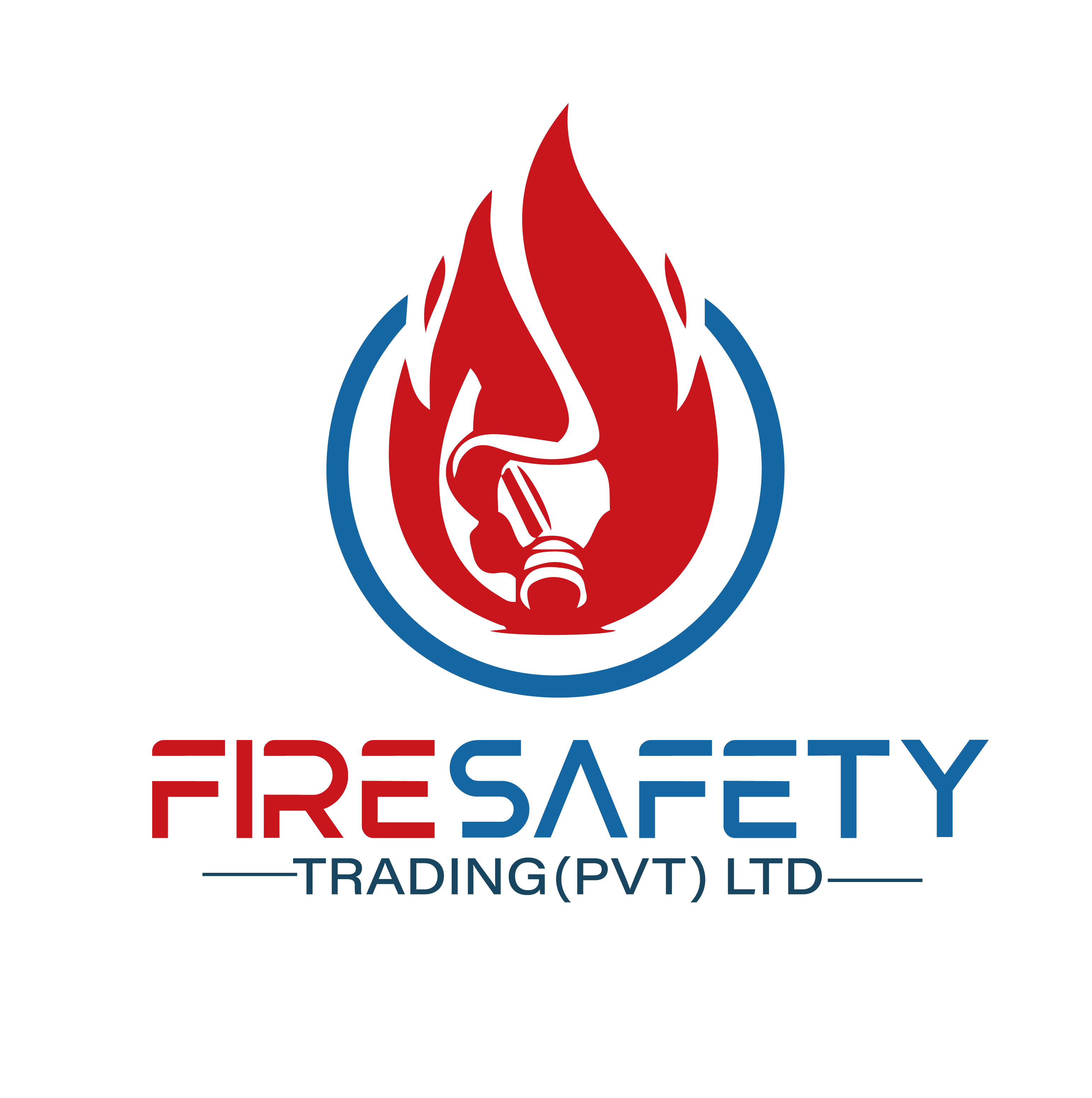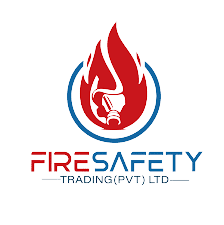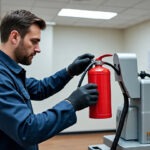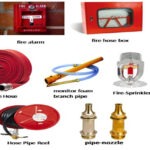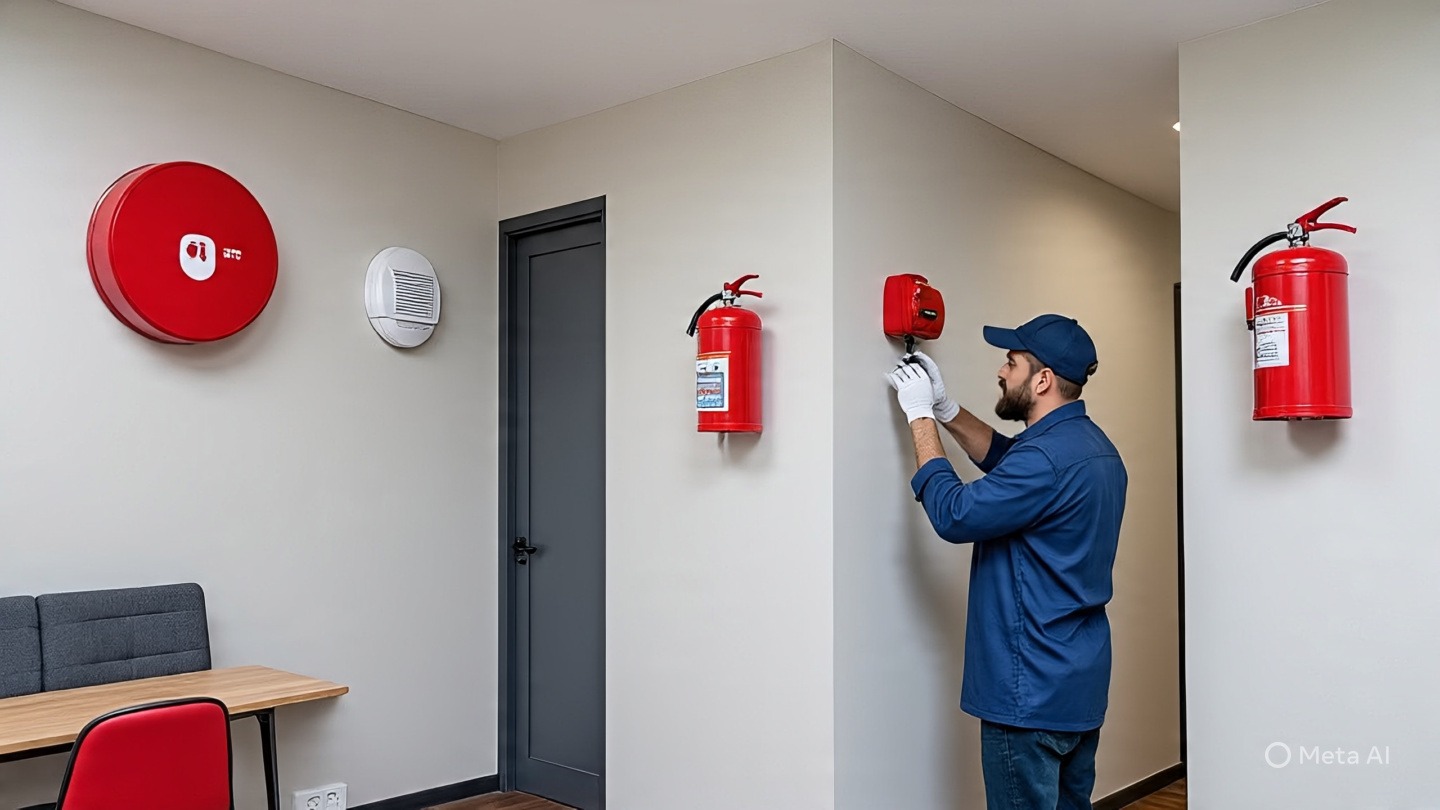Introduction to Fire Safety Equipment
Fire safety equipment is the backbone of protecting lives, property, and businesses in Pakistan. Islamabad, Karachi, Lahore, and other major cities face frequent fire risks in homes, offices, factories, and public spaces. A single spark can escalate quickly if proper equipment is not available or maintained.
The term “fire safety equipment” covers a wide range of tools and devices designed to detect, control, and extinguish fires. From simple smoke detectors in homes to complex fire suppression systems in large industries, each piece of equipment plays a vital role in preventing damage and ensuring safety.
Many people assume that having a fire extinguisher alone is enough, but effective fire safety is a combination of multiple devices and preventive measures. Certified equipment is designed to meet local and international safety standards while being user-friendly for both professionals and ordinary residents.
Modern fire safety equipment in Pakistan has evolved to meet urban challenges: electrical fires in offices, flammable chemicals in factories, and dense residential setups in Islamabad and Lahore. Proper awareness, selection, and maintenance of fire safety equipment are essential for reducing risk, saving lives, and protecting property.
By understanding the types, usage, and maintenance of fire safety equipment, homeowners, office managers, and business owners can create safer environments. Investing in certified and well-maintained equipment ensures peace of mind and legal compliance with Pakistani fire safety regulations.
Why Fire Safety Equipment is Essential
Fire safety equipment is not just a precaution; it is a critical requirement for protecting lives and property. Fires can erupt suddenly due to electrical faults, kitchen accidents, flammable chemicals, or industrial mishaps. Without the proper tools, a small incident can quickly escalate into a disaster.
Protection of Lives
The foremost reason for having fire safety equipment is to save lives. Smoke detectors, fire alarms, and extinguishers give occupants the chance to act quickly, either by controlling a small fire or evacuating safely. In residential settings, early warnings can prevent injuries, especially among children and the elderly.
Safeguarding Property
Fire safety equipment minimizes damage to property. Offices, homes, and factories contain valuable assets—documents, machinery, electronics, and personal belongings. Properly maintained extinguishers and suppression systems can control a fire before it spreads, significantly reducing financial losses.
Compliance with Regulations
In Pakistan, commercial and industrial buildings are required by law to have certified fire safety equipment. Failure to comply can lead to fines, penalties, or even closure. Professional installation and maintenance ensure that all equipment meets legal and safety standards.
Peace of Mind
Knowing that your environment is equipped to handle fire emergencies brings peace of mind. Homeowners, employees, and facility managers can focus on their daily tasks, confident that safety measures are in place.
Reducing Emergency Response Time
Quick access to fire safety equipment reduces the time it takes to respond to a fire. For example, a properly placed fire extinguisher or sprinkler system can stop a fire in its early stages, preventing escalation and minimizing potential harm.
Fire safety equipment is essential for life protection, property safety, legal compliance, and peace of mind. Ignoring its importance can lead to devastating consequences, while proper investment in certified equipment ensures preparedness for any fire emergency.
Types of Fire Safety Equipment
Fire safety equipment comes in various types, each designed to prevent, control, or extinguish fires efficiently. Understanding the different equipment helps homeowners, offices, and industries select the right combination for their needs.
1. Fire Extinguishers
Fire extinguishers are the most common fire safety devices. They are portable and designed to tackle small fires. Types include:
- Dry Chemical Powder (DCP): Effective on electrical fires, flammable liquids, and general combustibles.
- Carbon Dioxide (CO₂): Ideal for electrical fires and offices with electronics.
- Foam Extinguishers: Suitable for flammable liquid fires.
- Water Extinguishers: Best for ordinary combustible materials like wood and paper.
2. Fire Alarm Systems
Fire alarms detect smoke or heat and alert occupants immediately. They are crucial for both homes and workplaces, as early warning significantly reduces casualties and damage.
3. Smoke Detectors
Smoke detectors are small but life-saving devices. Installed in ceilings or kitchens, they detect smoke particles early and trigger alarms, giving people time to evacuate safely.
4. Fire Sprinklers
Sprinkler systems automatically release water or suppression agents to control fires in large buildings. They are essential in offices, hotels, hospitals, and industrial facilities.
5. Fire Blankets
Fire blankets are used to smother small fires or wrap around individuals whose clothing has caught fire. They are simple, safe, and effective for kitchen fires and small incidents.
6. Emergency Exit Signs and Lighting
Clearly marked exit signs and emergency lighting guide occupants to safety during a fire, especially in smoke-filled or dark environments.
7. Fire Hose Reels and Hydrants
These provide water access for professional firefighting in factories, warehouses, and commercial spaces. Proper placement and maintenance are critical for their effectiveness.
8. Personal Protective Equipment (PPE)
For professional firefighters or industrial settings, PPE like helmets, gloves, suits, and boots protect individuals from heat, flames, and smoke inhalation.
Selecting the right types of fire safety equipment depends on your environment, fire risks, and local regulations. A combination of extinguishers, alarms, detectors, and protective devices ensures comprehensive safety for homes, offices, and industrial facilities.
How to Choose the Right Fire Safety Equipment
Choosing the right fire safety equipment is essential to ensure that your home, office, or industrial facility is fully protected. Not all equipment is suitable for every environment, so making informed decisions is key.
1. Assess Fire Risks
Start by identifying potential fire hazards in your space:
- Electrical equipment in offices or homes
- Flammable liquids in kitchens or factories
- Industrial machinery or chemical storage in warehouses
Understanding the type of fire risks helps in selecting the correct extinguishers, alarms, and suppression systems.
2. Consider the Environment
Different spaces require different solutions:
- Homes: Smoke detectors, small DCP extinguishers, and fire blankets are usually sufficient.
- Offices: CO₂ extinguishers for electronics, smoke alarms, and emergency exit signage are essential.
- Factories/Industries: Large capacity extinguishers, sprinkler systems, hydrants, and PPE for workers are necessary.
3. Compliance with Regulations
Ensure that the equipment meets Pakistani fire safety standards and international certifications. Certified products are tested for efficiency and reliability. Using non-certified equipment can result in legal issues during inspections.
4. Ease of Use
Fire safety equipment should be user-friendly. Extinguishers with clear instructions, smoke detectors with audible alarms, and easy-to-read exit signs make a big difference during emergencies.
5. Supplier Reliability
Choose equipment from trusted suppliers in Pakistan who provide installation, maintenance, and warranty services. Certified suppliers guarantee that the equipment works correctly and can provide documentation for inspections.
6. Maintenance Requirements
Consider how easy it is to maintain the equipment. Some devices require regular servicing, refilling, or battery replacement. Proper maintenance ensures long-term reliability.
Choosing the right fire safety equipment involves assessing risks, understanding your environment, ensuring compliance, and selecting reliable suppliers. Properly chosen equipment is a cornerstone of effective fire safety in homes, offices, and industries across Pakistan.
Installation Guidelines and Best Practices
Proper installation of fire safety equipment is as important as selecting the right devices. Incorrect placement or setup can render even the best equipment ineffective. Following these guidelines ensures maximum protection for homes, offices, and industrial facilities in Pakistan.
1. Fire Extinguishers
- Install extinguishers in easily accessible locations near potential fire hazards, such as kitchens, electrical rooms, or chemical storage areas.
- Mount them at a height where the handle is approximately 1 meter from the floor for easy reach.
- Avoid placing them behind furniture or in obstructed areas.
- Ensure signage is clearly visible so everyone knows where the extinguisher is located.
2. Smoke Detectors and Fire Alarms
- Install smoke detectors on ceilings or high on walls, as smoke rises.
- Avoid placing detectors near windows, vents, or kitchens where cooking smoke may trigger false alarms.
- Test alarms regularly to ensure they are functioning correctly.
3. Fire Sprinklers
- Sprinkler systems should cover the entire area of the building for uniform protection.
- Ensure adequate water pressure and that the system is connected to a reliable water source.
- Avoid blocking sprinkler heads with furniture, shelves, or other objects.
4. Emergency Exit Signs and Lighting
- Place exit signs above doors and along hallways to guide occupants during evacuation.
- Use battery-backed lighting to ensure visibility during power outages.
- Regularly check lights and replace batteries as needed.
5. Fire Blankets
- Keep fire blankets in kitchens and high-risk areas where small fires may occur.
- Ensure they are mounted in a location where they can be quickly pulled out when needed.
6. Fire Hose Reels and Hydrants
- Install hose reels and hydrants according to the building layout and local regulations.
- Ensure hoses are checked for leaks, blockages, and proper water flow.
- Train staff on how to use them correctly in case of an emergency.
7. Personal Protective Equipment (PPE)
- Store PPE in designated areas near high-risk zones in factories or industrial setups.
- Ensure all personnel know where PPE is stored and how to use it properly.
- Inspect PPE regularly for wear and tear and replace when necessary.
Best Practices Summary
- Keep equipment visible and accessible.
- Conduct regular inspections and maintenance.
- Provide training to all occupants or staff on how to use the equipment.
- Follow manufacturer instructions and local regulations.
Proper installation and adherence to best practices significantly improve the effectiveness of fire safety equipment. Homes, offices, and industries that follow these guidelines are better prepared to prevent and respond to fire emergencies in Pakistan.
Maintenance and Regular Inspection
Maintaining fire safety equipment is as crucial as installation. Even the best equipment can fail if not regularly inspected and serviced. Regular maintenance ensures reliability, compliance, and safety in homes, offices, and industries across Pakistan.
1. Fire Extinguishers
- Check Pressure Gauges: Ensure the needle is in the green zone. Low pressure indicates the extinguisher may not function properly.
- Inspect Physical Condition: Look for corrosion, leaks, dents, or damaged hoses.
- Check Expiry Date: Most extinguishers require refilling or replacement every 1–5 years depending on type.
- Refilling: Engage certified service providers for refilling to ensure correct chemical levels and pressure.
2. Smoke Detectors and Alarms
- Test Weekly: Press the test button to ensure alarms are working.
- Replace Batteries: At least once a year or when the alarm indicates low battery.
- Clean Sensors: Dust and debris can reduce sensitivity; use a vacuum or soft cloth regularly.
3. Fire Sprinklers
- Inspect Heads: Check for leaks, corrosion, or obstructions.
- Test Water Pressure: Ensure sprinklers will activate effectively in case of fire.
- Professional Servicing: Schedule annual professional inspection to maintain system reliability.
4. Emergency Exit Signs and Lighting
- Check Functionality: Test lights and ensure batteries are charged.
- Visibility: Remove obstructions so signs are clearly visible from all points.
5. Fire Blankets and PPE
- Condition Check: Ensure blankets are intact and PPE is free from damage.
- Accessibility: Store in designated, easy-to-reach areas.
6. Fire Hose Reels and Hydrants
- Regular Flow Test: Ensure water is available and the hose functions properly.
- Inspect for Leaks: Check valves, connections, and nozzles.
7. Documentation
- Maintain logs of inspection dates, maintenance, and refilling.
- Certification from professional service providers adds credibility and ensures legal compliance for businesses.
Benefits of Regular Maintenance
- Guarantees equipment reliability during emergencies
- Extends lifespan of devices
- Reduces risk of fire-related accidents
- Ensures compliance with Pakistani fire safety regulations
- Enhances peace of mind for homeowners and businesses
Regular maintenance and inspection of fire safety equipment are essential steps to protect lives, property, and business continuity. Following a scheduled maintenance routine and engaging certified professionals ensures that your equipment is always ready to respond effectively during a fire emergency.
Common Mistakes to Avoid
Even with the best fire safety equipment, mistakes in usage, installation, or maintenance can reduce effectiveness. Understanding and avoiding these common errors ensures maximum protection for homes, offices, and industries in Pakistan.
1. Ignoring Regular Maintenance
One of the biggest mistakes is neglecting routine checks and servicing. Fire extinguishers lose pressure over time, smoke detectors need battery replacement, and sprinklers require inspection. Ignoring maintenance can make equipment unreliable during emergencies.
2. Wrong Placement of Equipment
Placing extinguishers, alarms, or emergency lights in inaccessible or hidden locations defeats their purpose. Equipment should always be visible, easily reachable, and near potential fire hazards.
3. Using Non-Certified Equipment
Purchasing cheap, non-certified equipment may save money initially, but it can fail during a fire, leading to property loss or injuries. Always invest in certified fire safety equipment from trusted suppliers in Pakistan.
4. Lack of Training
Even the best equipment is useless if people do not know how to use it. Regular training for family members, employees, or staff ensures everyone can operate extinguishers, alarms, and other devices correctly during emergencies.
5. Overlooking Expiry Dates
Extinguishers, smoke detectors, and fire blankets have limited lifespans. Using expired or worn-out equipment increases the risk of malfunction. Check expiry dates and replace or refill items on schedule.
6. Ignoring Local Regulations
Businesses often fail to comply with Pakistani fire safety regulations. Lack of compliance can result in fines, legal issues, or closure. Always ensure that equipment and installation meet local safety standards.
7. DIY Refilling Without Expertise
Attempting to refill extinguishers yourself without proper tools and training can be dangerous. It may lead to improper chemical levels, low pressure, or equipment damage. Professional services ensure safety and correct functioning.
Avoiding these common mistakes enhances the effectiveness and reliability of fire safety equipment. Proper placement, certified products, regular maintenance, training, and compliance with regulations are key to keeping homes, offices, and industrial facilities safe in Pakistan.
Fire Safety Equipment in Workplaces and Homes
Fire safety equipment is essential in both residential and commercial spaces. While the type and quantity of equipment may vary, the goal remains the same: protect lives, property, and ensure quick response during emergencies.
1. Residential Fire Safety
Homes in Islamabad, Lahore, and other cities should be equipped with basic fire safety devices:
- Fire Extinguishers: Keep small DCP or CO₂ extinguishers in kitchens and living areas.
- Smoke Detectors: Install on ceilings, especially in bedrooms and near kitchens, for early warning.
- Fire Blankets: Ideal for smothering small fires or protecting individuals from flames.
- Emergency Exits and Lighting: Ensure that exit paths are clear and marked.
Family members, especially children and elders, should know the location of extinguishers, blankets, and exits. Conducting fire drills at home enhances preparedness.
2. Workplace Fire Safety
Offices, factories, and commercial buildings face higher risks due to electrical equipment, flammable materials, and large occupancy. Essential fire safety equipment includes:
- Fire Extinguishers: CO₂ for electronics, foam for flammable liquids, and DCP for general use.
- Fire Alarms and Smoke Detectors: Ensure early detection and quick evacuation.
- Sprinkler Systems: Critical for controlling fires in multi-story buildings.
- Emergency Exit Signs and Lighting: Clearly marked exits help employees evacuate safely.
- Fire Hose Reels and Hydrants: Provide water access for professional firefighting teams.
- Personal Protective Equipment (PPE): For industrial workers, helmets, gloves, and suits protect against heat and smoke.
3. Importance of Compliance and Maintenance
Both homes and workplaces must follow local fire safety regulations. Regular inspection, maintenance, and refilling of extinguishers, testing alarms, and checking sprinklers ensure readiness in emergencies.
4. Training and Awareness
Fire safety equipment is only effective if people know how to use it. Conduct regular training sessions for staff and educate family members on proper usage, evacuation procedures, and emergency contacts.
Equipping homes and workplaces with the right fire safety equipment, maintaining it regularly, and ensuring everyone knows how to use it creates a safer environment. Proper preparation reduces the risk of injury, minimizes property damage, and ensures compliance with regulations in Pakistan.
Certified Suppliers and Services in Pakistan
Having fire safety equipment is only effective if it comes from reliable and certified suppliers. In Pakistan, certified services ensure that your equipment meets safety standards, functions properly, and is legally compliant.
1. Importance of Certified Suppliers
Certified suppliers provide:
- Genuine and tested products: Extinguishers, alarms, and sprinklers that meet national and international standards.
- Professional Installation: Correct placement, calibration, and setup to maximize effectiveness.
- Maintenance and Refilling Services: Ensures equipment is always ready for emergencies.
- Documentation and Certification: Legal proof of compliance, especially for offices, factories, and public buildings.
2. How to Identify Reliable Suppliers
- Check Certifications: Ensure suppliers are licensed and provide equipment with ISO or equivalent certifications.
- Experience: Suppliers with years of experience understand the local fire risks and regulations.
- Customer Reviews: Positive feedback from other clients reflects reliability and professionalism.
- After-Sales Support: Choose suppliers offering regular inspections, refilling, and repair services.
3. Leading Fire Safety Services in Pakistan
Major cities like Islamabad, Karachi, and Lahore have certified providers offering:
- Fire extinguisher sales, refilling, and maintenance
- Smoke and heat detection systems
- Sprinkler installation and servicing
- Emergency exit signage and lighting solutions
- Fire safety training for staff and families
4. Benefits of Using Certified Services
- Reliability: Equipment functions correctly in emergencies.
- Compliance: Meets Pakistan’s fire safety regulations.
- Peace of Mind: Assurance that safety measures are professionally managed.
- Long-Term Savings: Proper maintenance reduces replacement costs and avoids fines.
Engaging certified suppliers and professional services is crucial for effective fire safety. Homes, offices, and industries in Pakistan should prioritize licensed providers to ensure their equipment is dependable, legally compliant, and ready to protect lives and property at all times.
Benefits of Using Professional Fire Safety Equipment
Investing in professional fire safety equipment provides significant advantages over low-quality or DIY solutions. For homes, offices, and industrial spaces in Pakistan, professional equipment ensures reliability, compliance, and efficiency during emergencies.
1. Guaranteed Reliability
Professional fire safety equipment undergoes rigorous testing to ensure it functions correctly under real-life conditions. Certified fire extinguishers, alarms, and sprinkler systems perform reliably, giving you confidence that you can handle a fire effectively.
2. Compliance with Regulations
Using professional equipment ensures adherence to local and international standards. Offices, factories, and public buildings avoid fines and legal complications, while meeting requirements during government inspections.
3. Long-Term Cost Savings
Although professional equipment may have a higher initial cost, it offers long-term savings:
- Reduced replacement frequency due to durable products
- Fewer damages from small fires
- Avoiding legal penalties for non-compliance
- Lower insurance premiums in some cases
4. Peace of Mind
Knowing your fire safety equipment is professional-grade and maintained regularly provides peace of mind. Families, employees, and management can focus on their daily activities without worrying about fire hazards.
5. Advanced Features
Professional devices often include:
- Digital pressure monitoring for extinguishers
- Smart smoke and heat detection systems
- Automated sprinkler systems for large buildings
- Integrated alarm systems with mobile notifications
6. Expert Support and Training
Certified suppliers provide installation, maintenance, and training services. Staff and family members learn how to operate extinguishers, alarms, and other equipment properly, ensuring efficient responses during emergencies.
Using professional fire safety equipment in Pakistan guarantees reliability, compliance, efficiency, and peace of mind. Homes, offices, and industrial facilities benefit from advanced features, expert support, and long-term protection against fire hazards.
Cost Considerations in Pakistan
Investing in fire safety equipment is essential, but understanding cost factors helps homeowners, businesses, and industries plan effectively. Prices vary depending on the type, capacity, brand, and certification of the equipment.
1. Fire Extinguishers
- Dry Chemical Powder (DCP): Usually affordable, ranges from PKR 3,500 to PKR 10,000 depending on size (2kg–6kg).
- CO₂ Extinguishers: Slightly higher, PKR 6,000–12,000 for 2kg–5kg units, ideal for electronics and offices.
- Foam and Water Extinguishers: PKR 4,000–9,000 for residential and small commercial use.
- Refilling Costs: Typically PKR 800–2,500 depending on type and service provider.
2. Fire Alarms and Smoke Detectors
- Basic smoke detectors: PKR 1,500–3,500 per unit
- Fire alarm systems with multiple sensors: PKR 10,000–50,000 for offices and commercial buildings
- Maintenance and battery replacement costs: PKR 500–1,000 annually per device
3. Sprinkler Systems
- Sprinkler installation in commercial spaces: PKR 50,000–300,000 depending on building size and number of sprinklers
- Annual maintenance: PKR 5,000–20,000
4. Fire Blankets and PPE
- Fire blankets: PKR 1,000–3,000
- Personal protective equipment for industrial staff: PKR 5,000–15,000 per set
5. Factors Affecting Cost
- Brand and Certification: Certified international brands cost more but offer higher reliability.
- Capacity and Size: Larger extinguishers or extensive alarm systems cost more.
- Installation Services: Professional installation adds to initial costs but ensures proper functioning.
- Maintenance and Refilling: Regular servicing prevents failures and extends equipment life.
6. Cost-Benefit Analysis
While initial investment may seem high, costs are justified by:
- Protection of lives and property
- Reduced damage and financial losses
- Compliance with regulations
- Lower insurance premiums
Understanding the cost considerations helps plan an effective fire safety strategy. Investing in certified and professionally installed equipment ensures long-term protection and compliance while minimizing risks in Pakistan.
Future Trends in Fire Safety Equipment
Fire safety equipment is constantly evolving to meet modern challenges. In Pakistan, growing urbanization, industrial expansion, and technological advancements are shaping the future of fire protection.
1. Smart Fire Safety Devices
- IoT-Enabled Alarms: Smoke detectors and fire alarms connected to mobile apps can alert homeowners and facility managers instantly.
- Digital Pressure Monitors: Fire extinguishers with digital gauges provide real-time status updates, reducing the risk of failure.
- Automated Sprinkler Systems: Advanced sprinklers can adjust water flow based on fire intensity and location.
2. Eco-Friendly Fire Suppression
- Clean Agent Extinguishers: Using environmentally safe chemicals that do not harm electronics or surroundings.
- Reduced Water Sprinklers: Sprinklers designed to use minimal water while maintaining effectiveness, ideal for offices and residential buildings.
3. Integration with Building Management Systems
Modern offices and factories in Pakistan are adopting integrated safety solutions. Fire safety equipment will be linked with security cameras, emergency lighting, and evacuation plans for comprehensive monitoring and quick response.
4. Professional Services Expansion
- Increased demand for certified fire safety services in cities like Islamabad, Karachi, and Lahore.
- On-site refilling, maintenance, and training programs becoming standard practice for businesses and residential complexes.
5. Focus on Training and Awareness
- Technology will complement education and awareness programs.
- Virtual reality and simulation-based fire drills will train employees and families on proper emergency responses.
6. Regulatory Improvements
- Stricter enforcement of safety regulations will ensure compliance.
- Certification processes and mandatory equipment checks will become more rigorous for commercial and industrial buildings.
The future of fire safety equipment in Pakistan is moving towards smarter, eco-friendly, and integrated solutions. Combining advanced technology, professional services, and awareness programs will significantly improve preparedness, reduce risks, and protect lives and property in homes, offices, and industries.
Stay Safe with Proper Fire Safety Equipment
Fire safety equipment is an essential investment for homes, offices, and industrial facilities in Pakistan. From fire extinguishers and smoke detectors to sprinklers and PPE, every device plays a critical role in preventing injuries, saving lives, and minimizing property damage.
Key Takeaways
- Life Protection: Properly installed and maintained equipment provides early warnings and control during fire emergencies.
- Property Safety: Timely intervention reduces damage to valuable assets, equipment, and infrastructure.
- Legal Compliance: Using certified devices and professional services ensures adherence to Pakistani fire safety regulations.
- Peace of Mind: Knowing that your environment is equipped to handle fire risks reduces anxiety and improves overall safety.
- Professional Advantage: Certified suppliers and trained personnel enhance the reliability and effectiveness of fire safety measures.
Final Thoughts
Fire incidents can happen unexpectedly, and their consequences can be severe. Ensuring that fire safety equipment is properly selected, installed, and maintained is the most effective way to prevent disasters. Homes, offices, and industrial setups across Islamabad, Karachi, Lahore, and other Pakistani cities benefit immensely from professional fire safety solutions.
By investing in certified fire safety equipment, conducting regular maintenance, and educating everyone on proper usage, you not only comply with regulations but also create a safer environment for all. Fire safety is more than just equipment—it is a commitment to protecting lives, property, and the community.
Stay proactive. Stay safe. Invest in proper fire safety equipment.
